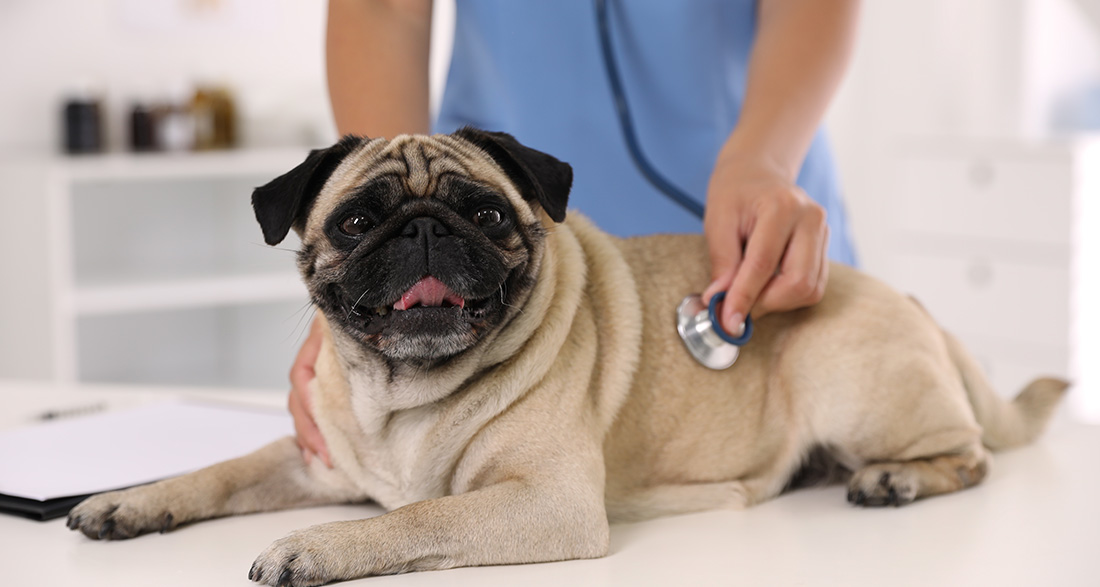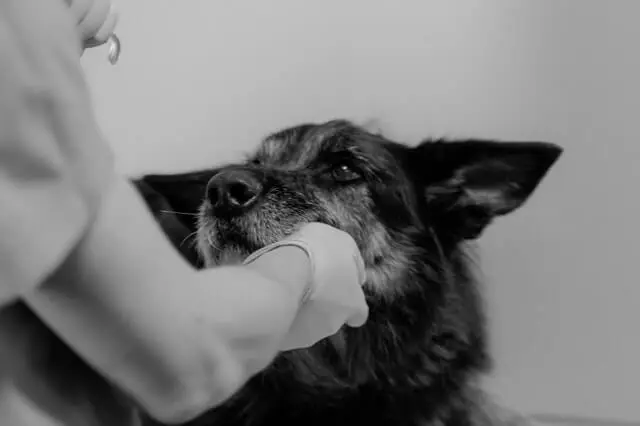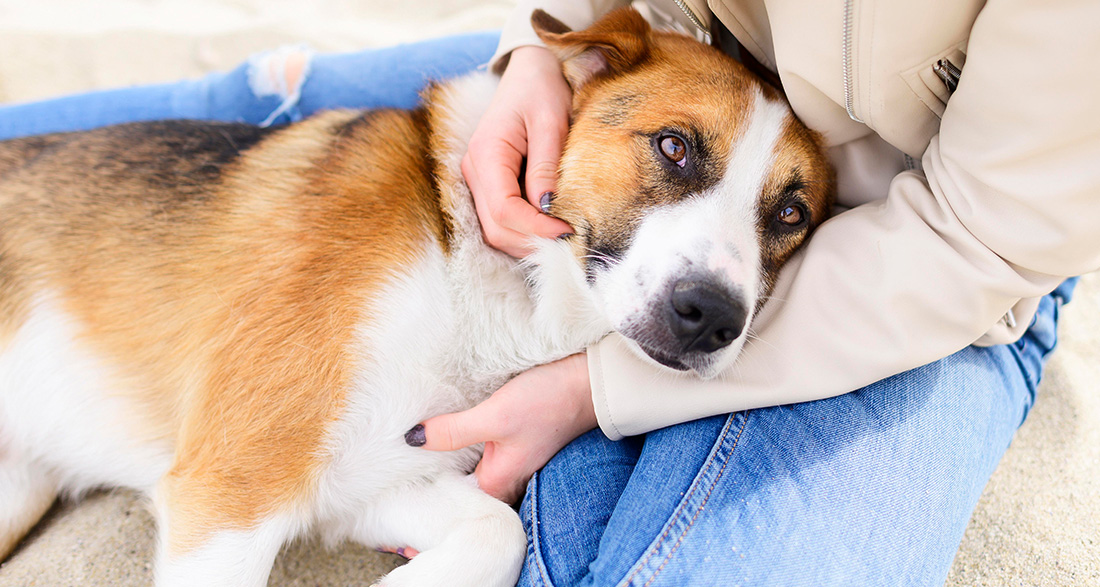Intestinal obstruction in dogs is a veterinary emergency. Therefore, it is crucial to assess the situation correctly and promptly seek the assistance of a veterinarian for the treatment of intestinal obstruction.
- The Ileus
- Causes of Ileus
- Symptoms of Intestinal Obstruction
- Instructions for Action When Suspecting Ileus
- How is Intestinal Obstruction in Dogs Treated by the Veterinarian?
- Can Intestinal Obstruction in Dogs be Prevented?
- Bones in Moderation
- Watch for Constipation
- Care for the Animal After the Emergency
- Further Important Notes on Intestinal Obstruction in Dogs
Your dog can no longer pass stool. This is not referring to a simple form of “constipation” that dogs occasionally experience. If the dog only has constipation, the passage of stool resumes regularly within a day or earlier. Additionally, with constipation, small amounts of stool still make their way outward.
Veterinarians refer to an obstruction of the intestine as an ileus. Characteristic of this condition are intense, shock-like symptoms such as:
- Projectile vomiting of any food and fluids,
- Partially vomiting stool,
- A swollen and hardened abdominal area.
The primary focus is on the futile and relentless straining that does not lead to the passage of stool.
Various causes can be considered for ileus. Some diseases can increase the risk, and foreign bodies in the intestinal area can cause intestinal blockage.
In case of any suspicion of ileus, you should immediately contact a veterinarian. Your animal is in considerable pain and may be in a life-threatening condition. A rupture of the intestine is imminent.
In this scenario, undigested food slurry from the intestine would spill into the abdominal cavity. Peritonitis and sepsis can be the consequences. Untreated, affected animals die from circulatory failure and shock.
The Ileus
An ileus is not a disease in the proper sense. Rather, it is a specific situation involving the digestive organs. In this state, the chyme (partly digested food) can no longer pass through the intestine, and undigested components cannot be expelled.
Experts differentiate between mechanical and functional forms of intestinal obstruction. In a mechanical event, the intestine becomes blocked in a way that makes the passage of chyme impossible. The delicate intestinal tract expands as undigested food accumulates.
In a functional ileus, there is a malfunction in the intestinal area. Typically, this can involve intestinal paralysis, which brings the entire movement of the intestine to a standstill. The medical term for movement in the intestinal area is intestinal motility. In this case as well, the chyme accumulates in the intestine, causing it to expand.
What makes intestinal obstructions particularly dangerous is not only the risk of rupture. The accumulated chyme disrupts the entire complex and very delicate nervous network in the intestine. The stagnant chyme releases toxins to the surrounding tissue. These substances can damage the sensitive intestinal wall.
The mucous membrane becomes inflamed and becomes permeable. This allows toxic substances to enter the blood and the entire body. Intestinal obstructions pose a potentially life-threatening danger.

Causes of Ileus
A situation where chyme can no longer pass through the intestine can be attributed to various causes:
- Congenital abnormalities in the intestine
- Intestinal paralysis due to poisoning, shock, injuries, or other external influences
- Ingested foreign bodies that are stuck in the intestine
- Intestinal stricture with almost complete closure of the intestine
- Intestinal invagination caused by the entanglement of intestinal loops
- Severe constipation, for example, due to bone fragments
- Polyps and tumors
Behind an intestinal obstruction often lie chronic diseases in the intestinal region of dogs. Irritable bowel syndrome exists in quadrupeds as well. In the English-speaking world, irritable bowel syndrome is known by the abbreviation IBD for Irritable Bowel Syndrome. Therefore, the diagnosis IBD in dogs has gained acceptance among veterinarians.
The deeper causes of irritable bowel syndrome are not yet fully researched. However, it is possible that constant inflammatory conditions in the intestinal area may increase the risk of intestinal entanglements, polyps, and tumors. These factors raise the risk of intestinal obstruction.
Bloody diarrhea in dogs can be a serious warning signal that there are disturbances in the animal’s digestive system. This is especially true if this diarrhea occurs frequently.
Cushing’s syndrome in dogs – a serious hormonal disorder – is associated with changes in the animal’s intestinal region. It also leads to a distended abdomen and digestive disorders.
While this condition is not directly linked to an increased risk of ileus, some symptoms of this disorder can be easily confused with an acute obstruction. Constipation may also be associated with it, potentially promoting an ileus.
Symptoms of Intestinal Obstruction
All symptoms of an ileus have in common that they occur suddenly within a short period and are critical. The affected animal appears seriously ill, and its condition continues to deteriorate.
Common signs in this situation include:
- Inability or extremely limited ability to pass stool
- Persistent straining
- Vomiting of stool
- Dog’s abdomen is distended, hard, and visibly painful
- Lethargy and apathy
- Muscle weakness
In this overall picture, fever in dogs may also indicate an ileus. Take any relevant symptoms seriously.
Instructions for Action When Suspecting Ileus
Bring the animal immediately to a veterinarian. Do not waste time. Characteristic of this situation is the progressive deterioration and the clearly recognizable discomfort in dogs. Vomiting in this condition is comprehensive. Many animals cannot retain either food or fluid.

How is Intestinal Obstruction in Dogs Treated by the Veterinarian?
Veterinarians make individual decisions regarding the necessary diagnostics and treatment for each case of intestinal obstruction. Infusions can initially stabilize dogs, and tranquilizers and pain relievers for dogs may also be considered.
In this situation, a veterinarian will do everything to prevent intestinal rupture and acute circulatory failure.
In many cases, only a surgical procedure provides relief. This is the case when there is a blockage of the intestinal passage. The notorious bone fragments are often only removable through surgery. Bone fragments occur when dogs consume excessive amounts of bones, hardening the stool in unimaginable ways.
Even after the successful treatment of intestinal obstruction, additional medical measures may be necessary. This depends on the damage the event has already caused to the intestinal walls.
Depending on the severity of the case, emergency treatment for ileus can cost between $800 and $2000.
Can Intestinal Obstruction in Dogs be Prevented?
Apart from some anatomical predispositions in some animals, nutrition predominantly determines prevention. Avoid letting your pet ingest foreign bodies. These pose a danger not only to the intestinal area but may also contain toxic substances or cause a blockage in the dog’s digestive passage.
Appropriate nutrition can be implemented for dogs in various ways. Some experts swear by a natural diet, such as the BARF diet. Others consider optimally formulated commercial food to be ideal. The individual needs of your dog may influence the choice. Consult your veterinarian for nutritional advice.
Bones in Moderation
An excess of bones is not part of appropriate dog nutrition. Sharp, splintering bones, such as those from chickens, are taboo because they can injure the entire digestive tract of dogs, including the esophagus.
Bone fragments harden the stool. It is emphasized again that bone fragments pose a serious risk of intestinal obstruction. Intestinal obstructions can be easily avoided in this regard by refraining from excessive bone feeding. Observe your dog.
Some animals naturally only gnaw the meat off the bone but do not consume the bone substance. Others also consume the bones. If your pet is a bone enthusiast, it’s best not to feed any. Boiled bones are particularly dangerous. They may seem soft but can form a hard substance in excessive amounts in the digestive tract, promoting blockages.
Watch for Constipation
Constipation should generally be an exception for dogs. Frequent constipation indicates that your pet is not optimally nourished. Consult with a veterinarian if you are uncertain about this issue and notice frequent constipation. Bloody diarrhea in dogs is a genuine alarm signal.
Possible causes include foreign bodies or incompatible substances in the diet, as well as inflammatory bowel diseases. If you suspect IBD in dogs, discuss this issue with the veterinarian.

Pay Attention to Underlying Conditions
For certain severe and chronic diseases such as Cushing’s syndrome in dogs or inflammatory bowel diseases, adjust the diet in consultation with the veterinarian to match the conditions. This is especially important when diseases are associated with inflammatory conditions in the intestine.
If the intestine is already inflamed, and there is a backlog of chyme in this situation, intestinal obstruction becomes even more dangerous. Try to positively influence the inflammatory situation with supplements like Omega-3 fatty acids. High-quality frankincense extracts also have anti-inflammatory effects.
Stay Alert
Similar to gastric torsion, it is crucial to recognize possible symptoms of this emergency in the case of ileus. Stay calm and try to reassure the animal. Immediately seek the veterinarian’s assistance together.
Explain your suspicion of an intestinal obstruction in the practice. Insist that your dog receives immediate medical attention and help. Most dogs are at risk of life-threatening circulatory failure – shock – during events like intestinal obstructions.
Initial measures can aim to calm the animal. Tranquilizers for dogs may be life-saving in this case. After that, diagnostics and rapid treatment take precedence. In many cases, treatment will involve emergency surgery.
Care for the Animal After the Emergency
Consider, in the initial period after ileus, that your pet has survived a life-threatening situation. Dedicate a lot of time to it; be gentle. Engage in appropriate dog nutrition. We can recommend the high-quality wet food from Anifit, which avoids sugars, colorings, and preservatives, containing a high meat content and essential fibers.
We cannot stress enough: Nutrition is a key element for preventing intestinal obstruction.
Further Important Notes on Intestinal Obstruction in Dogs
Ideally, you should prevent ileus in a dog’s life. Be aware that you are best preventing such an event by keeping an eye on your dog’s behavior and condition. Intestinal obstruction in dogs has causes, and many of them you can influence.
This involves aspects such as:
- Foreign bodies
- Nutrition
- Bone fragments in stool
- Exercise
- Protection against shock events like injuries
- Regular monitoring of your pet’s eliminations
In this context, consider that your pet cannot directly communicate if it suffers from abdominal pain and bloating. You must infer possible health disorders, such as the development of intestinal obstruction, through careful observation of its behavior.


